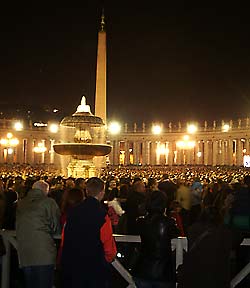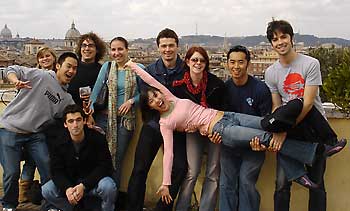UC Berkeley Web Feature
UC students in Rome watch papal history unfold on their doorstep
BERKELEY – When 23 UC Berkeley students arrived at the UC Study Center in Rome last January, they never imagined they'd have a front-row seat for one of the biggest news stories of the year.
 UC Berkeley student Dana Schechter took this photo of mourners filling St. Peter's Square the night Pope John Paul II died. Schechter and her fellow participants in UC's Education Abroad Program in Rome have had front-row seats for much of the ensuing spectacle at the Vatican. |
"Rome truly had the world's attention, and there I was — in the middle of it all," marveled Valerie Norton, 21, who is majoring in political science and public policy.
"It was one of the most memorable experiences in my life. Hands down," wrote 21-year-old Jessica Camacho, a history and religious studies major.
Starting Monday (April 18), the College of Cardinals is meeting in Rome's Sistine Chapel to choose a new pope, sending up smoke signals from the burned ballot papers to indicate whether or not they've found a successor to John Paul.
Not far from the chapel lives Dana Schechter, a 20-year-old political science major who says Rome is still swarming with people.
 Berkeley student Dana Schechter got a priest to take this photo of her in front of St. Peter's Basilica as they joined hundreds of thousands of mourners filling the square during the four-hour funeral service for Pope John Paul II. |
"There still are cameras everywhere, police at every corner, and reporters interviewing people all day long," wrote Schechter, who is from Orange County. "Tents have been set up in parks to house the pilgrims staying through the conclave," the cardinals' confidential meeting.
The students said daily life in I Prati, their neighborhood, began changing weeks before the pope's death. As his health failed, they watched TV crews set up encampments in St. Peter's Square, Italian police and the military station themselves sometimes a foot apart on certain streets, and a city of 3 million people stretch to accommodate at least 3 million more.
By the time the pope died, the students' usual 30- to 40-minute walk to class — through the Vatican, over the Tiber River and down historic Vittorio Emanuele Street —was taking three times as long because of the crowds and blocked-off roads. To return home at night, Schechter said she had to show proof of residency, then be escorted by police through the chaos.
Helicopters flew overhead day and night, tented medical facilities aided pilgrims collapsing from dehydration and exhaustion, and sirens blared constantly, added Camacho.
Schechter was recruited by KCBS radio in San Francisco to be a short-term Rome correspondent. "At 1 a.m., they would call my cell phone for a live report," she said. Her mother also saw her on TV while watching CNN's coverage of the funeral.
Norton, whose hometown is Alameda, said she was "practically run over by the U.S. motorcade on my walk home as it whizzed George Bush, George Bush Sr., Bill Clinton and Condoleezza Rice to St. Peter's Basilica" for the funeral.
She added that a special teach-in about the pope held by one of the program professors, Father Philip Larrey, was "very beneficial to everyone," helping UC students better understand and appreciate what was happening around them.
 Weeks before the pope died, UC students from Berkeley, UCLA and Santa Cruz hammed it up outside the Capitoline Hill museums, overlooking the dome of St. Peter's Basilica in the historic center of Rome. (Photo courtesy Valerie Norton) |
This semester, 75 undergraduates from various UC campuses are in the Rome program, which began Jan. 19 and ends May 14, said Scott McElhinney, the Education Abroad Program adviser at UC Berkeley for Italy. (The program also is offered in the fall.) They are studying the history and culture of Italy, and especially of Rome, through classes including Ancient Roman Civilization, Religions of Rome, the Age of Michelangelo and Renaissance Literature.
The core program is taught in English by faculty members from Italian universities and from the University of California. The students, who have not taken more than a year of Italian before they arrive, study the language throughout the term.
Being participants in — and not just observers of — the recent events in Rome is what the three UC Berkeley students said made their once-in-a-lifetime learning experience in Italy even more powerful.
"Living so close to the Vatican, how could I not participate in the events taking place?" wrote Schechter, who stood in line through the night to see the pope's body, and later attended the four-hour-long funeral.
"At 7:30 a.m., I finally made it inside and was able to view the pope for 25 seconds," she said. "It was worth the eight-hour wait through the night, as well as the one hour I spent sleeping on the ground of St. Peter's Piazza."
What struck her most, however, was the humanity displayed by the crowd waiting in an endless line outside St. Peter's. "When you're fatigued, hungry and thirsty, you usually worry about yourself, yet the morale there was different," she said. "Complete strangers offered to share a panini, or fruit from their backpacks."
For Camacho, a Catholic who'd hoped to glimpse the pope while in Rome and got her wish numerous times, his death "came out of nowhere," she said, and greatly impacted her life.
As soon as she heard he was dead, Camacho ran to St. Peter's Square and, like the thousands and thousands of people gathered there, she cried. She described herself as "not the most devout Catholic," but said "all anyone could do was cry" in the midst of such a tumultuous situation.
"The emotion was overwhelming," she said. "The bells rang and the cardinal came out … I noticed all these people on their hands and knees crying, and the people standing up were just holding each other. I closed my eyes, and all I could hear was crying."
"I had found such peace in this man and the ceremonies every Sunday that he led, and it had been taken away in a split second," she wrote, adding that John Paul was "more than just a man of religion, he was a man who showed this world what a leader ought to embody and how we should conduct ourselves as human beings — honest, hard-working and full of energy.
"That's why so many people mourned and cried, why I cried … He crossed boundaries, he built bridges, he understood the importance of communication."
Norton chose to camp out in the streets with countless people from around the world to attend the funeral on April 8. She said she joined a group "playing guitars and singing 'Kumbayah' to pass the time. The whole night was very peaceful, very moving and very unifying.
"The pictures on TV just didn't do it justice, and no words can describe what it was like to experience such camaraderie with so many different cultures and nationalities. It really spoke to me about humanity — everyone came together and slept in the streets, all to honor the same man the next morning."
Added Norton, "The most distinctive emotion I felt throughout was that there is nothing as incredible as watching history unfold in front of you."

